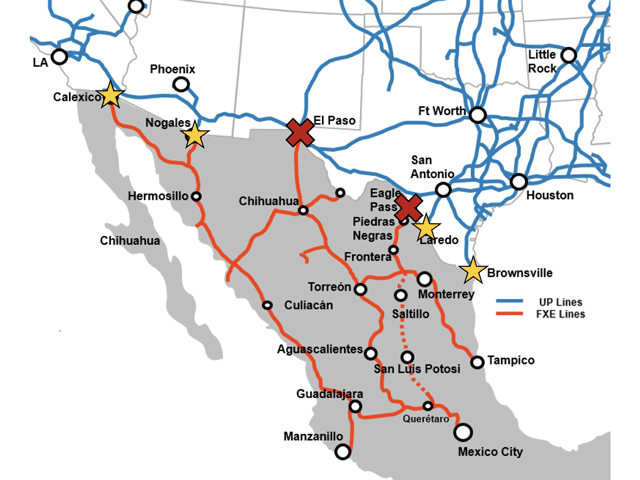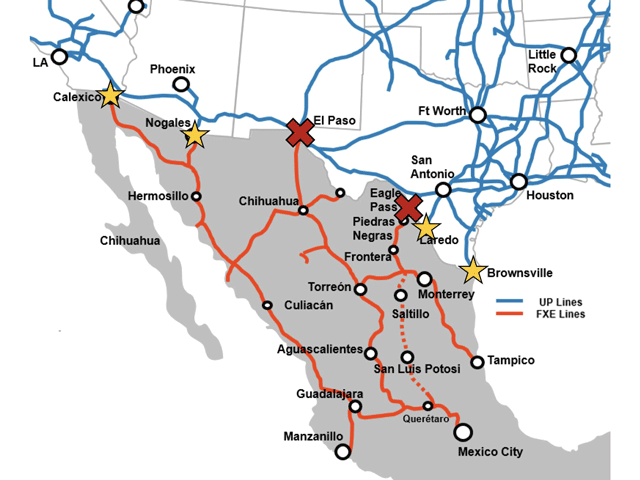Market Matters Blog
Railroads to CBP: Reopen International Crossings at Eagle Pass, El Paso
The Association of American Railroads and other agriculture groups are calling for the U.S. Customs and Border Patrol (CBP) to reopen international rail crossings at Eagle Pass and El Paso, Texas, after service was suspended beginning Dec. 18.
On Dec. 17, 2023, the CBP released a statement saying that beginning Dec. 18, the CBP's Office of Field Operations was "temporarily suspending operations at the international railway crossing bridges in Eagle Pass and El Paso, Texas, to redirect personnel to assist the U.S. Border Patrol with taking migrants into custody. CBP will continue to prioritize our border security mission as necessary in response to this evolving situation."
CBP added, "After observing a recent resurgence of smuggling organizations moving migrants through Mexico via freight trains, CBP is taking additional actions to surge personnel and address this concerning development, including in partnership with Mexican authorities."
Response to this action was swift. The Association of American Railroads (AAR) in a press release called on CBP to reopen the international crossings at Eagle Pass and El Paso as both are key arteries for the North American rail network.
"The urgency of reopening these crossings and restoring rail service between the two nations cannot be overstated," said AAR President and CEO Ian Jefferies. "There are not separate U.S. and Mexican rail networks; there is only one interconnected North American rail network. Every day the border remains closed unleashes a cascade of delay across operations on both sides of the border, impacting customers and ultimately consumers."
P[L1] D[0x0] M[300x250] OOP[F] ADUNIT[] T[]
The CBP decision most directly and immediately impacts operations for two Class I railroads, Union Pacific and BNSF, and the customers those companies serve. Combined, these two carriers securely operate 24 trains daily at these crossings, moving agricultural products, automotive parts, finished vehicles, chemicals, consumer goods and more to customers spanning the continent. But ultimately, every railroad is affected by this sudden shutdown of operations since all carriers interchange goods across the North American rail network, noted the press release.
In a separate statement posted on its website, Union Pacific urged that the Eagle Pass and El Paso border crossings be reopened immediately. "These locations represent 45% of cross-border Union Pacific business and include goods critical to the U.S. economy. There isn't enough capacity at our other four gateways to reroute them. With Christmas and the New Year's holidays just days away, Union Pacific is in close communication with multiple government agencies and our customers, urging that the crossings closed by U.S. Customs and Border Protection be reopened. While the company understands this is a complex humanitarian crisis, most migrants are not crossing the border on trains."
According to a Railway Age Dec. 18 article, service had been halted previously at the two crossings in September when Mexican railway operator Ferromex (FXE) temporarily suspended 60 trains on its south-north routes "because of an increasing number of migrants climbing aboard railcars, and suffering injuries and fatalities," said FXE.
The National Grain and Feed Association (NGFA) and the North America Export Grain Association (NAEGA) issued a statement on Dec. 18 in response to the closing of the two international rail crossings at Eagle Pass and El Paso.
"The NGFA and NAEGA call for the immediate reopening of the Eagle Pass and El Paso, Texas, railroad crossings to allow for the immediate passage of trains between the United States and Mexico. The North American market and grain trade supply chain are deeply intertwined. The closure of these two crossings is impacting the flow of grain and oilseeds for both human and livestock feed to one of the United States' most important export markets and trading partners. According to USDA data, rail represents 64% of grain and oilseed exports to Mexico, including 15,565,138 metric tons of grains and oilseeds exported via rail in 2021 and 3.45 metric tons of grains and oilseeds in the third quarter of 2023."
NGFA and NAEGA noted in their statement that they learned of grain trains in multiple states being held for shipment due to CBP's embargo. "The critical nature of this issue is growing by the hour, particularly for those livestock feeders that may run short of feed," said the statement.
"We are deeply concerned by the developing situation and request that CBP work with us, the railroads and other federal partners to develop a common sense and expedient solution that reopens this critical mode of agricultural transportation for the U.S. and North American markets."
CBP press release: https://www.cbp.gov/…
AAR press release: https://www.aar.org/…
UP statement on reopening border crossings: https://www.up.com/…
Mary Kennedy can be reached at mary.kennedy@dtn.com
Follow her on X, formerly known as Twitter, @MaryCKenn
(c) Copyright 2023 DTN, LLC. All rights reserved.






Comments
To comment, please Log In or Join our Community .